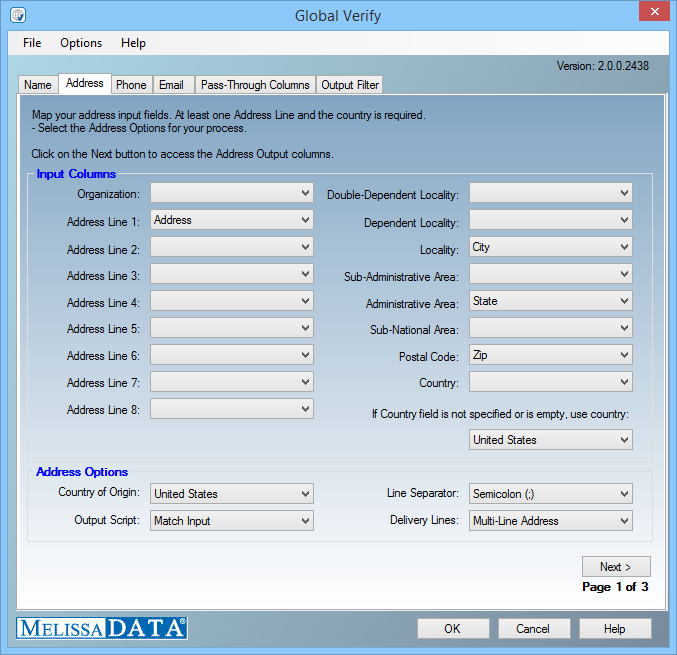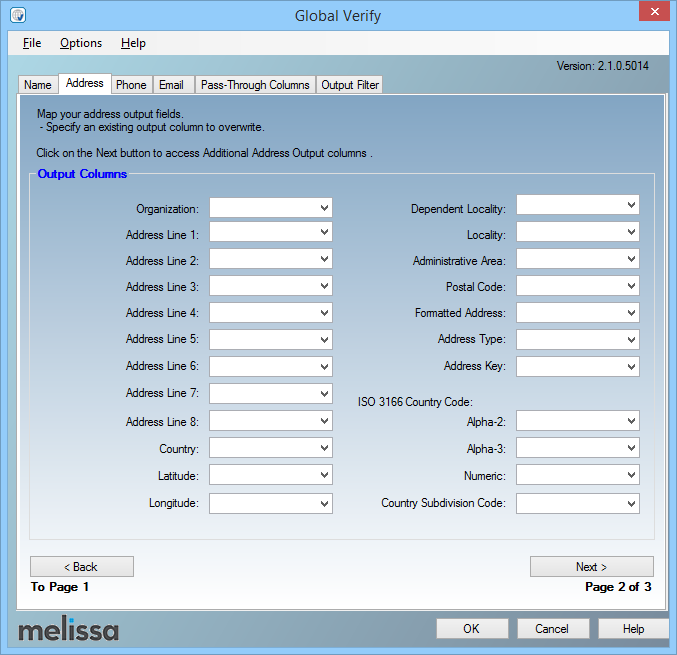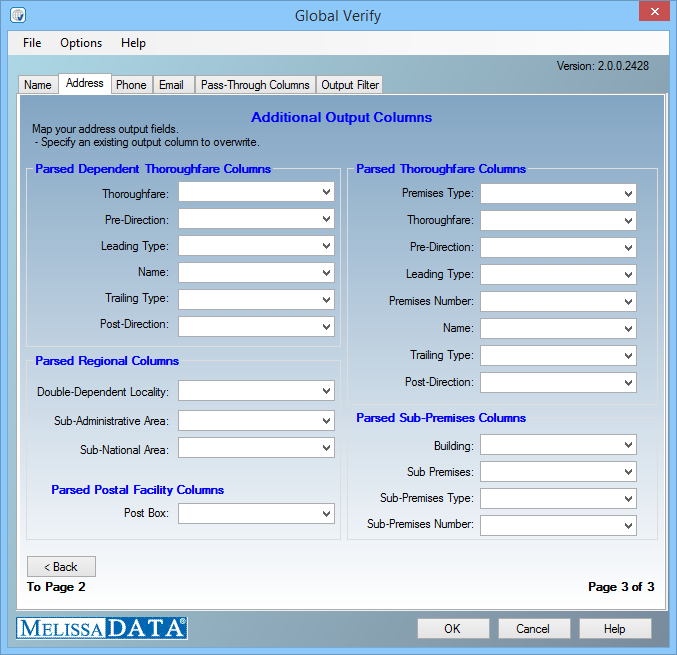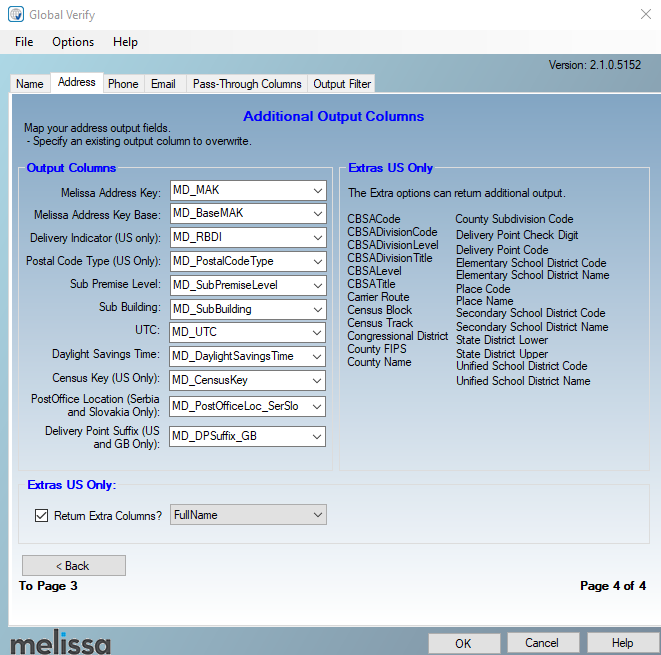This wiki is no longer being updated as of December 10, 2025.
|
SSIS:Global Verify:Address
Jump to navigation
Jump to search
← SSIS:Data Quality Components
| Global Verify Navigation | |||||||
|---|---|---|---|---|---|---|---|
| Overview | |||||||
| Tutorial | |||||||
| |||||||
| |||||||
|
Advisory - Global Verify Address On Premise - 32bit mdGlobalAddr.dll deprecation
The Global Address Object 32bit mdGlobalAddr.dll file will be deprecated on April 24th 2023. SSIS Global Verify Address On Premise users will be directly affected and will not be able to continue using SSIS Global Verify Address On Premise option. For more information, please visit SSIS Global Verify Address On Premise Users – Global Address Object 32bit dll Deprecation.

Map the address input and output fields. Navigate between pages 1 to 4 by using the Next and Back buttons on the bottom of the window.
Input Columns
- Organization
- The name of any organization associated with the address record.
- Address Line 1-8 (Address Line 1 Required)
- Input fields for the address. Should contain the delivery address information (house number, thoroughfare, building, suite, etc.) but should not contain locality information (locality, administrative area, postal code, etc.) which have their own inputs.
- At least one Address Line is required.
- Last Name (US only)
- This field has been added to allow the use of a Melissa proprietary database. For addresses missing a secondary like a suite or apartment, we can use the last name and append that information for residential addresses. This feature is only available for the US.
- Double-Dependent Locality
- The smallest population center data element. Depends on the Locality and Dependent Locality elements.
- Dependent Locality
- A smaller population center data element. Depends on the Locality element.
- US Term: Urbanization.
- In terms of US Addresses, this element applies only to Puerto Rican addresses. It is used to break ties when a ZIP Code is linked to multiple instances of the same address.
- Locality (Required)
- The most common population center data element.
- US Term: City.
- Canadian Term: Municipality.
- See Note 1.
- Sub-Administrative Area
- The smallest geographic data element.
- US Term: County.
- Administrative Area (Required)
- The most common geographic data element.
- US Term: State.
- Canadian Term: Province.
- See Note 1.
- Sub-National Area
- The administrative region within a country on an arbitrary level below that of the sovereign state.
- Postal Code (Required)
- The complete postal code for a particular delivery point.
- US Term: ZIP.
- Canadian Term: Postcode.
- See Note 1.
- Country (Required)
- The country name, abbreviation, or code.
- If Country field is not specified or is empty, use country
- If the Country field is not specified or empty, select a country in the drop-down menu to use.
Note 1
- For US and Canada Only:
- You must set either Locality and Administrative Area or Postal Code. If all three elements are provided and the Postal Code is incorrect, it can be corrected from the data on the Locality and Administrative Area.
Address Options

- Country of Origin
- This is used to determine whether or not to include the country name as the last line in Formatted Address
- Acceptable Value: Any valid ISO-3166-1 Alpha-2, ISO-3166-1 Alpha-3, or ISO-3166-1 Numeric code.
- If blank, invalid, or the same as the destination country, then the destination country is not appended to the end of the formatted address.
- If valid and different from the destination country, then the destination country is appended to the formatted address.
- US or US Territory:
- If Country of Origin and destination country being verified are both US or US Territories then the country will not be appended to Formatted Address.
- US Territories will have “Unite States of America” appended if the Country of Origin is not a US Territory, but the Country Name and ISO codes will be that of the territory.
- Canada is treated like any other non-US Territory.
- Output Script
- The character set to use to format the output data.
- Match Input: Return the output in the same script used in the input.
- Latin: Convert all output to the latin character set.
- Line Separator
- The delimiter to use to separate multiple lines in the data returned by Formatted Address.
- Delivery Lines
- Select the addressing style that best describes the type of data that you would like to output.
Applies to US or CA Addresses
- USPreferredCityNames
- If set to on, we will override and return only the USPS preferred city name. When set to off it will leave valid vanity city names as preferred by the USPS.
- USStandardizationType
- When set to Auto this uses the input as a guide for how to standardize. When set to Short (Default) will leave the US address in short abbreviated form as preferred by the USPS.
- For example Short:
100 W Main St East
- For example Long:
100 West Main Street East
- DetailedResults
- This is for users that have experience or code using Address Object and would like to have those codes alongside the Global Address result codes.
- When set to
ON(For US and CA addresses only) this will return more detailed and different result codes that come from our Address Object product. When set toOFF(Default) No extra result codes will be returned.
- When set to
Output Columns

- Organization
- Matches the organization input field. It is not modified or populated by Global Verify Component.
- Address Line 1-8
- Will return the standardized or corrected contents of the input address. These lines will include the entire address including the locality, administrative area, and postal code.
- Country
- The country name, abbreviation, or code.
- Latitude (US and Canada Only)
- This is parsed from the input.
- Longitude (US and Canada Only)
- This is parsed from the input.
- Dependent Locality
- A district, area, or neighborhood (Turkey) within a Locality required to uniquely identify an address.
- Locality
- A city (US), town, or municipality (Canada) that is the most common population center element within an Administrative Area.
- Administrative Area
- A state (US), province (Canada), or canton (Switzerland) contained within a Country.
- Postal Code
- The postal code or ZIP code (US) for the input address.
- Formatted Address
- The address in the correct format for mailing from the country specified. This includes the Organization as the first line, one or more lines in the origin country’s format, and the destination country (if required).
- Address Type (US and Canada Only)
- Returns a one-character code for the type of address coded.
- For a complete list of these codes, see Address Type Codes.
- Address Key (US and Canada Only)
- This is a unique key for the address.
- The Address Key can be used by other Melissa Data services, such as Geocoder or Delivery Indicator.
ISO 3166-1 Country Code
- Alpha-2
- Letter code of the output country. Ex: For United States; Canada; and the Philippines: US; CA; PH.
- Alpha-3
- Letter code of the output country. Ex: For United States; Canada; and the Philippines: USA; CAN; PHL.
- Numeric
- Numeric code of the output country. Ex: For United States; Canada; and the Philippines: 840; 124; 608.
- Country Subdivision Code
- This is the ISO3166-2 code for country subdivisions, usually tied to the administrative area for a country. The format is the 2 letter country code followed by a dash followed by 2 or 3 characters or two numbers. Examples are: US-CA, CN-16, or AU-VIC.
- Currently, this field is only populated for some countries. These countries are: AE, AR, AT, AU, BB, BE, BH, BR, BS, CA, CH, CL, CN, CO, CR, DE, DK, DM, DO, ES, FI, FJ, FR, GB, GH, GT, GY, HN, ID, IE, IL, IN, IS, IT, JP, KR, KW, LT, LU, LV, MX, MY, NC, NG, NI, NL, NO, NZ, PE, PH, PK, PL, PR, PT, RS, SA, SG, SI, SV, TH, TR, UA, US, UY, VN.
- Disclaimer - On-Premise does not support this field and will return empty.
Additional Output Columns

Parsed Dependent Thoroughfare Columns
- Thoroughfare
- Name of the street or block data element.
- Pre-Direction
- Prefix directional contained within the Thoroughfare field.
- Leading Type
- Leading thoroughfare type indicator within the Thoroughfare field.
- Name
- Name indicator within the Thoroughfare field.
- Trailing Type
- Trailing thoroughfare type indicator within the Thoroughfare field.
- Post-Direction
- Postfix directional contained within the Thoroughfare field.
Parsed Regional Columns
- Double-Dependent Locality
- An area or village (UK) within a Dependent Locality required to uniquely identify an address.
- Sub-Administrative Area
- Not commonly used. An arbitrary region smaller than a Country but larger than an Administrative Area.
- Sub-National Area
- A county (US) or region larger than the Locality but smaller than the Administrative Area.
Parsed Postal Facility Columns
- Post Box
- Post box information for a particular delivery point.
Parsed Thoroughfare Columns
- Premises Type
- Leading premise type indicator within premises field.
- Thoroughfare
- Name of the street or block data element.
- Pre-Direction
- Prefix directional contained within the Thoroughfare field.
- Leading Type
- Leading thoroughfare type indicator within the Thoroughfare field.
- Premises Number
- Alphanumeric indicator within premises field.
- Name
- Name indicator within the Thoroughfare field.
- Trailing Type
- Trailing thoroughfare type indicator within the Thoroughfare field.
- Post-Direction
- Postfix directional contained within the Thoroughfare field.
Parsed Sub-Premises Columns
- Building
- Descriptive name identifying an individual location.
- Sub Premises
- Alphanumeric code identifying an individual location.
- Sub-Premises Type
- Sub premises type indicator within the premises field.
- Sub-Premises Number
- Sub premises number indicator within the premises field.
Output Columns

- MelissaAddressKey
- This is a globally unique and persistent key for the location, even if parts of the address change. When an address is fully validated this field returns a 10-digit proprietary key for the address. With AddressKey (US and Canada only), if an address zip code changes, the AddressKey would also change. Melissa Address Key (MAK) is independent and will not change. This makes MAK a good way to permanently identify and locate addresses. Once you have a MAK it can be used as an input in most Melissa services and thus is a good tool for deduping. Currently available for US, CA, GB, IT, SI, PT, FR, AU, SG, NL, VN, BM, and TR with many more countries planned for the future.
- MelissaAddressKeyBase
- Every full address has its own Melissa Address Key (MAK). If that address is a suites or apartment, we will also return a Melissa Address Key Base (BaseMAK) that corresponds to the overall building. This provides a link between all the individual MAK addresses that belong to the same building. This field also returns a 10-digit proprietary key. Note, if we can validate the address to the building but not the suite, we can return just the BaseMAK. Currently available for countries that have support for MelissaAddressKey.
- DeliveryIndicator
- This field returns a one character code that indicates if the address is a residence (R), business (B), or unknown (U). It is not available for all countries. Currently, it is available only for the US but more countries are planned for future inclusion.
- PostalCodeType
- This is a country dependent field. This field returns an identifier that represents the type of postal code returned. Currently only the US uses this field.
Code Definition P PO Box Postal Code U Unique Postal Code usually assigned to a large organization or government institution. M Military Postal Code Empty Regular postal code
- SubPremiseLevel
- This is a secondary piece of subpremise information used to describe a more generic division of the subpremise. For example, if you have an address like “1123 Market Way, Floor 12 Apt 25A” then the Subpremises will be “Apt 25A” and the SubPremiseLevel will be “Floor 12”. This value is not widely used in official address data.
- SubPremiseLevelType and SubPremiseLevelNumber make up the SubPremiseLevel. In our example, the SubPremiseLevelType is “Floor” and the SubPremiseLevelNumber is “12”.
- SubBuilding
- This value describes a smaller division of the building. For example, if an address has a building name that is a part of a larger set of buildings, then the subbuilding may be populated.
- SubBuildingType and SubBuildingNumber make up the parts of SubBuilding.
- UTC
- Returns the Coordinated Universal Time number in format of UTC+#. Note that there are timezones that are not whole hours only, like UTC+9:30.
- DST
- Returns a Y or a N based on if the country or area of the input observes daylight savings time. Note that the value returned by the UTC output does not change based on whether the country/area is currently in daylight savings time for not. We will only return the standard timezone and this flag to indicate is daylight savings is observed.
- CensusKey
- This is a country dependent field. It is designed to return a code that correspond to the census division information for a country. Currently, this field is only returned for the US.
Code Definition US The CensusKey for the US is a 15 or 16 digit code that is made up of the following components: FIPS Code, Census Tract, Census Block, and CensusBlockGroup if it exists
- PostOfficeLocation
- This field, if available for a country, returns the value that is associated to the location of the post office in relation to the address. This value may or may not be used in the official mailing address for the country in question. Currently, these are the countries we will return the data for: Serbia and Slovakia.
Code Definition Serbia The PostOfficeLocation contains the old 5 digit postal number and name. The postal code field will contain the new 6 digit PAK number. Slovakia The PostOfficeLocation returns the name of the post office location if it is not the same as the delivery address locality.
- DeliveryPointSuffix
- This is a country dependent field. This field returns an identifier that represents asuffix code usually tied to a delivery point. For US This returns the 2 digit delivery point assigned by the USPS to an DPV validated address. For GB This is a 2 character (first is numerical, 2nd character is alphabetic) that is assigned by Royal Mail. When added to the postal code, this allows each live delivery point to be uniquely identified.
Extra US Only
- Extras option
- This element is usually not populated but is reserved to be able to return less used fields if the user requests. Currently, we are using this to return some US only fields. This output requires an additional output Destination component to be added to the project. If Extras is
ON, we can return additional outputs. These outputs are presented in a different format. They will look like this below.
Field Definition CBSA Outputs Core-Based Statistical Areas (CBSA) outputs. These values are assigned by the US Census. CBSACode CBSADivisionCode CBSADivisionLevel CBSADivisionTitle CBSALevel CBSATitle CarrierRoute Carrier Route Code assigned by the USPS. CensusBlock The Census block number from the most recent yearly census CensusTract The Census tract number from the most recent yearly census CongressionalDistrict The congressional district number for the address CountyFIPS The Census FIPS number from the most recent yearly census CountyName The county name that corresponds to the county FIPS code CountySubdivisionCode The county subdivision code value as defined by the US Census CountySubdivisionName The county subdivision name value as defined by the US Census DeliveryPointCheckDigit The single digit value that acts as a checksum to the delivery point code DeliveryPointCode The 2 digit delivery point code as assigned by the USPS ElementarySchoolDistrictCode Returns a 5 digit string representing the elementary school district code for the address ElementarySchoolDistrictName Returns a 5 digit string representing the elementary school district code for the address PlaceCode The FIPS Place code as defined by the Census PlaceName The FIPS Place name as defined by the Census SecondarySchoolDistrictCode The secondary school district code for the address SecondarySchoolDistrictName The secondary school district name for the address StateDistrictLower Returns a 3 digit string representing the Lower State District Code for the requested record StateDistrictUpper Returns a 3 digit string representing the Upper State District Code for the requested record UnifiedSchoolDistrictCode Returns a 5 digit string representing the Unified School District Code if the address is in a unified school district UnifiedSchoolDistrictNameString Returns a 5 digit string representing the Unified School District Name if the address is in a unified school district